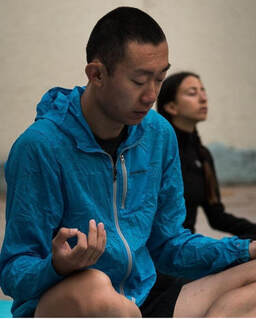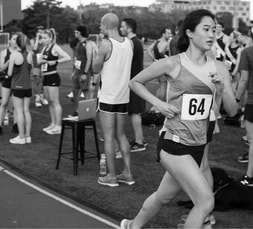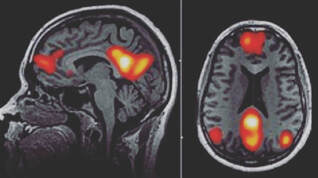 There are many ways to improve running performance besides simply going out for a run. Mental practice can be just as important as physical practice when it comes to getting through tough workouts, racing strong, and managing nerves. There are various approaches to practicing mentality for sport, but I find mindfulness meditation to be especially effective. This post will explain the effects meditation has on the brain and how it may benefit your running performance. Bear with me, at first this post may not seem directly related to running, but they will get there! I want to go through how to meditate and the science behind it before moving on to sports performance. How do I meditate? The goal of meditation is to practice actively thinking about nothing except what is going on in the present moment. There are two main techniques that are commonly used when meditating- Awareness of Breath (AOB) and Noting. AOB is the focus on your breath or a particular body sensation to keep you in the present moment. When you notice your mind drifting, simply note this as a thought or feeling and refocus on your breath (this is noting!). At first one may have difficulty preventing their thoughts from wandering for even a couple of seconds. This is normal and why you practice! You can complete mindfulness meditation exercises on your own, but I find using guided meditation apps to be very helpful, especially if the practice is new for you. The @headspace app (pictured here) is my favorite. They have guided meditation series for everything including sleep, managing stress, loneliness, athletic performance, mindful eating, productivity, and strengthening relationships. You can complete a 2-week free trial to see what you think! How does my brain change during meditation?During meditation, one practices focusing on the present moment and gently pushing away thoughts about the past or future. The brain doesn't know the difference between what we think and what we experience. So if one imagines something related to the past or the future, on some level they will experience that event and all emotions it provokes. With consistent meditative practice, one can reduce the activation of the Default Mode Network (DMN), a circuit of brain regions that is primarily active during passive mind-wandering. This picture is an fMRI scan of such regions. Hyper-connectivity of neurons in the DMN has been linked to anxiety, depression, chronic pain, and PTSD. Studies have shown structural changes to and deactivation of the DMN after consistent meditation. Such deactivation of the DMN may be beneficial to sports performance which will be described tomorrow. How can meditating benefit my running?1. Running in the present momentWhen one practices meditation, they practice deactivating their Default Mode Network by focusing on thoughts relevant only to the present moment. How many times during a hard workout have you had the thought, "How will I possibly be able to hold this pace and feel this strain for X more miles?" or "If I feel this way now, I will feel so much worse in X miles." ? Whenever thoughts about not being able to finish cross my mind, I rely on my meditative practice. Instead of concerning myself with the future, I think, "Am I okay in this present moment?" Most often I am. I refocus my mind on my breath and avoid thoughts about how I may feel later in the race. These thoughts are typically inaccurate anyways. The more you practice meditating outside of running, the easier these brain circuits can be implemented during strenuous exercise. 2. Reducing nerves While some amounts of nervous energy can be beneficial, experiencing too much pre-race/ workout anxiety can compromise performance. There are two parts of the autonomic nervous system - the parasympathetic, which calms you down, and the sympathetic, which revs you up. When you feel stressed or nervous, the sympathetic system kicks in, flooding your body with stress hormones that increase your heart rate and respiration. One of the most powerful ways to deactivate the sympathetic response and calm down before a big race is awareness of breath, since breathing is controlled by the autonomic nervous system. By keeping your focus entirely on your breath, you'll be able to reduce the amount of stress hormones that enter into your bloodstream and calm pre-race/ workout anxiety. Then, you can smile on the start line, like me and my college teammates back in 2012. Again, the more you practice mediation/awareness of breath away from race day, the easier it will be to implement at more crucial moments. 3. Avoiding negative thoughtsWhen meditating, one practices the skill of Noting, which is when one notes then gently pushes away negative thoughts. Sometimes these thoughts are anxieties about the future or worries about how we have acted in the past. Other times they are doubts about ourselves. When racing it is not unusual to question your abilities. No one is immune to occasionally thinking "I'm not good enough", "I'm not capable", and "I didn't prepare enough". If you have practiced noting negative thoughts, gently pushing them away, and refocusing on the breath, this untrue frame-of-mind will quickly disappear and not affect your performance. Again, the more you practice outside of running, the easier it will be when running hard. 4. Kinesthetic Imagery Previously, we discussed how activation of the Default Mode Network of the brain is detrimental for sports performance and how meditation can reduce such activation. I wanted to make sure that it was clear that there are some situations where activation of this area of the brain can help performance. If one imagines something related to the past or future, on some level they will experience that event and all emotions it provokes through DMN activation. If those thoughts about the future are productive, such as imagining yourself achieving your goal, you are mentally rehearsing a positive scenario. This makes it easier to implement in real life. This is called kinesthetic imagery, which is a fancy term for mentally practicing physical skills. It's used when golfers practice their swing in their mind or runners practice reacting to moves made during competition. Kinesthetic energy is not part of mindfulness meditation, but is similar in regards to having control over what you are thinking/feeling and using that control to your advantage during competition.
0 Comments
Leave a Reply. |
Archives
November 2020
Categories |


 RSS Feed
RSS Feed